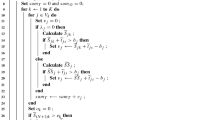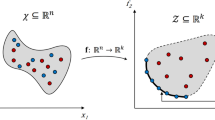Abstract
Equivalent simplification is an effective method for solving large-scale complex problems. In this paper, the authors simplify a classic project scheduling problem, which is the nonlinear continuous time-cost tradeoff problem (TCTP). Simplifying TCTP is a simple path problem in a critical path method (CPM) network. The authors transform TCTP into a simple activity float problem and design a complex polynomial algorithm for its solution. First, the authors discover relationships between activity floats and path lengths by studying activity floats from the perspective of path instead of time. Second, the authors perform simplification and improve the efficiency and accuracy of the solution by deleting redundant activities and narrowing the duration intervals of non-redundant activities. Finally, the authors compare our method with current methods. The relationships between activity floats and path lengths provide new approaches for other path and correlative project problems.
Similar content being viewed by others
References
Akkan C, Drexl A, and Kimms A, Network decomposition-based benchmark results for the discrete time-cost tradeoff problem, European Journal of Operational Research, 2005, 165: 339–358.
Elmaghraby S E and Kamburowski J, The analysis of activity networks under generalized precedence relations (GPRs), Management Science, 1992, 38(9): 1245–1263.
Hebert J E and Deckro R F, Combining contemporary and traditional project management tools to resolve a project scheduling problem, Computers and Operations Research, 2011, 38: 21–32.
Choi K and Kwak Y H, Decision support model for incentives/disincentives time-cost tradeoff, Automation in Construction, 2012, 21: 219–228.
Choi B C and Chung J, Complexity results for the linear time-cost tradeoff problem with multiple milestones and completely ordered jobs, European Journal of Operational Research, 2014, 236: 61–68.
Choi B C and Park M J, A continuous time-cost tradeoff problem with multiple milestones and completely ordered jobs, European Journal of Operational Research, 2015, 244: 748–752.
Szmerekovsky J G and Venkateshan P, An integer programming formulation for the project scheduling problem with irregular time-cost tradeoffs, Computers and Operations Research, 2012, 39: 1402–1410.
Kim J Y, Kang C W, and Hwang I, A practical approach to project scheduling: Considering the potential quality loss cost in the time-cost tradeoff problem, International Journal of Project Management, 2012, 30: 264–272.
Demeulemeester E L and Herroelen W S, Project Scheduling: A Research Handbook, Boston/ Dordrecht/London: Kluwer Academic Publishers, 2002.
De P, Dune E J, Ghosh J B, et al., Complexity of the discrete time-cost tradeoff problem for project networks, Operations Research, 1997, 45: 302–306.
Nabipoor Afruzi E, Roghanian E, Najafi A A, et al., A multi-mode resource-constrained discrete time-cost tradeoff problem solving using an adjusted fuzzy dominance genetic algorithm, Scientia Iranica, 2013, 20: 931–944.
Vanhoucke M, New computational results for the discrete time/cost trade-off problem with timeswitch constraints, European Journal of Operational Research, 2005, 165: 359–374.
Hadjiconstantinou E and Klerides E, A new path-based cutting plane approach for the discrete time-cost tradeoff problem, Computational Management Science, 2010, 7: 313–336.
Afshar A, Ziaraty A K, and Kaveh A, Nondominated archiving multicolony ant algorithm in time-cost trade-off optimization, Journal of Construction Engineering and Management, 2009, 135: 668–674.
Milenkovic M, Bojovic N, Ribeiro R A, et al., A fuzzy simulated annealing approach for project time-cost tradeoff, Journal of Intelligent & Fuzzy Systems, 2012, 23: 203–215.
Parveen S and Saha S K, A GA-based fuzzy optimal model for time-cost trade-off in a project with resources consideration, International Journal of Industrial and Systems Engineering, 2013, 15: 153–170.
Falk J E and Horowitz J L, Critical path problem with concave cost-time curve, Management Science, 1972, 19: 446–455.
Nahapetyan A and Pardalos P M, A bilinear relaxation based algorithm for concave piecewise linear networks flow problems, Journal of Industrial and Management Optimization, 2007, 3: 71–85.
Moussourakis J and Haksever C, Project compression with nonlinear cost functions, Journal of Construction Engineering and Management, 2010, 136(2): 251–259.
Lamberson L R and Hocking R R, Optimum time compression in project scheduling, Management Science, 1970, 16: 597–606.
Kapur K C, An algorithm for the project cost/duration analysis problem with quadratic and convex cost functions, IIE Transactions, 1973, 5: 314–322.
Siemens N and Gooding C, Reducing project duration at minimum cost: A time cost trade-off algorithm, Omega, 1975, 3: 569–581.
Elmaghraby S E and Salem A, Optimal project compression under convex cost functions I: Quadratic cost with continuous derivative, OR Technical Report, 158, North Carolina State University, Raleigh, 1980.
Elmaghraby S E and Salem A, Optimal project compression under convex cost functions II, OR Technical Report, 157, North Carolina State University, Raleigh, 1980.
Panagiotakoplos D, A CPM time-cost computational algorithm for arbitrary activity cost function, INFOR, 1977, 15: 183–195.
Moder J J, Phillips C R, and Davis E W, Project Management with CPM, PERT and Precedence Diagramming, 3rd Edition, Van Nostrand Reinhold Company, New Jersey, 1983.
Deckro R F, Hebert J E, Verdini W A, et al., Nonlinear time/cost tradeoff model in project management, Computers & Industrial Engineering, 1995, 28: 219–229.
Amir A and Reza T M, Multi-objective time-cost trade-off in dynamic PERT networks using an interactive approach, European Journal of Operational Research, 2007, 180: 1186–1200.
Kwon O, Lee S, and Son J, Advanced time-cost trade-off model using mixed integer programming, Korean Journal of Construction Engineering and Management, 2015, 16(6): 53–62.
Pathak B K, Srivastava S, and Srivastava K, Neural network embedded multiobjective genetic algorithm to solve non-linear time-cost tradeoff problem of project scheduling, Journal of Scientific & Industrial Research, 2008, 67: 124–131.
Wang Z and Zhu D, A line search filter secant method for nonlinear equality constrained optimization, Journal of Systems Science and Complexity, 2010, 23(2): 343–361.
Gu G and Zhu D, A dwindling filter line search algorithm for nonlinear equality constrained optimization, Journal of Systems Science and Complexity, 2015, 28(3): 623–637.
Pathak B K and Srivastava S, Integrated ANN-HMH approach for nonlinear time-cost tradeoff problem, International Journal of Computational Intelligence Systems, 2014, 7: 456–471.
Halman N, Li C L, and David S L, Fully polynomial-time approximation schemes for time-cost tradeoff problems in series-parallel project networks, Operations Research Letters, 2009, 37: 239–244.
Yamashita D S andMorabito R, A note on time/cost tradeoff curve generation for project scheduling with multi-mode resource availability costs, International Journal of Operational Research, 2009, 5: 429–444.
Li X, Qi J, and Su Z, Free float theorem and algorithm of seeking the k-th order critical path, Journal of Management Sciences in China, 2009, 12(2): 98–104.
Author information
Authors and Affiliations
Corresponding author
Additional information
This research was supported by the Science and Technology Foundation of Jiangxi Provincial Department of Education in China under Grant No. GJJ161114, the Natural Science Foundation of China under Grant No. 71271081, and the Soft Science Research Base of Water Security and Sustainable Development of Jiangxi Province in China.
This paper was recommended for publication by Editor WANG Shouyang.
Rights and permissions
About this article
Cite this article
Su, Z., Qi, J. & Wei, H. Simplifying the nonlinear continuous time-cost tradeoff problem. J Syst Sci Complex 30, 901–920 (2017). https://doi.org/10.1007/s11424-017-5175-z
Received:
Revised:
Published:
Issue Date:
DOI: https://doi.org/10.1007/s11424-017-5175-z




